
Best AI for Coding: Top 10 AI Tools for Software Developers in 2025
As we step into 2024, the software development landscape continues to evolve, with AI playing a leading role.
In this post, we’ll take a closer look at the top ten AI tools and assistants that are reshaping the way developers write, debug, and optimize code.
From automating mundane tasks to providing insightful coding suggestions, these AI solutions are essential for any developer looking to stay ahead in the fast-paced world of technology. You don’t want to miss out!
What are AI coding assistants?
AI coding assistants are software tools that use artificial intelligence to support and enhance the software development process.
These tools are designed to assist programmers by automating routine coding tasks, suggesting code improvements, detecting potential bugs, and providing relevant documentation. They can adapt to individual coding styles and preferences, providing personalized recommendations that help streamline the development workflow.
By integrating with existing development environments, AI coding assistants aim to increase productivity, improve code quality, and reduce the time and resources required for software projects.
In this article, we are going to cover ten of the best AI code generators and discover their key pros and cons.
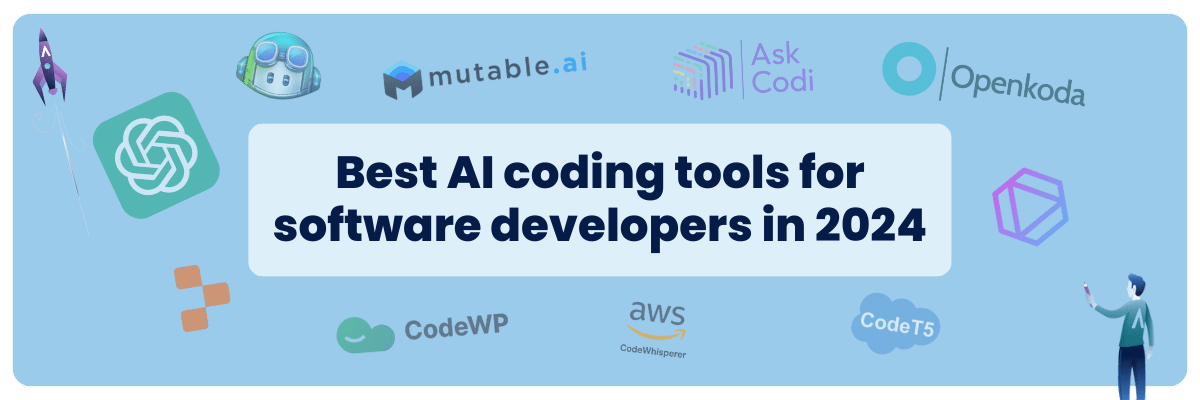
Is it possible to code with AI?
The short answer is, of course.
Over the past year, we’ve seen people perform more and more impressive programming tasks using AI prompts.
From creating a website from a napkin sketch to building an Angry Birds clone using only AI code.
Each of these examples astounded audiences of software developers and business leaders who are accustomed to software development cycles that are incredibly time and resource consuming. But thanks to AI, a single creative developer, or even a less technical person, can now create something quite remarkable and impressive.
It seems that all you need is an idea and some out-of-the-box thinking.
But can we replace all programming tasks with AI?
Not yet.
Maybe sometime in the future, there will be tools to automatically design, develop, and deploy full-featured, enterprise software. But that future isn’t here yet.
For now, AI can be a very powerful tool in the software developer’s arsenal, speeding up the programmer’s work and reducing the time spent on mundane and repetitive tasks. But no matter how advanced, no AI tool can yet replace the creative thinking and deep programming knowledge of an experienced developer, especially when it comes to architectural designs.
There’s also the issue of quality.
ChatGPT and other LLMs can only go so far because they work with existing data. These tools can sometimes get lost, fall down the rabbit hole, and produce rather unusable snippets of code. So if you are a programmer using AI in your work – be careful and always remember to check the quality of the generated code!
Having said that, AI technology is developing at a breakneck pace, and even now it is an incredibly helpful asset in writing code.
[Read also: Can ChatGPT Write Code?]
Benefits of AI coding tools
The benefits of AI tools are not limited to natural language code generation.
As you will see in this list, these tools can benefit businesses, people learning to code, as well as experienced dedicated developers.
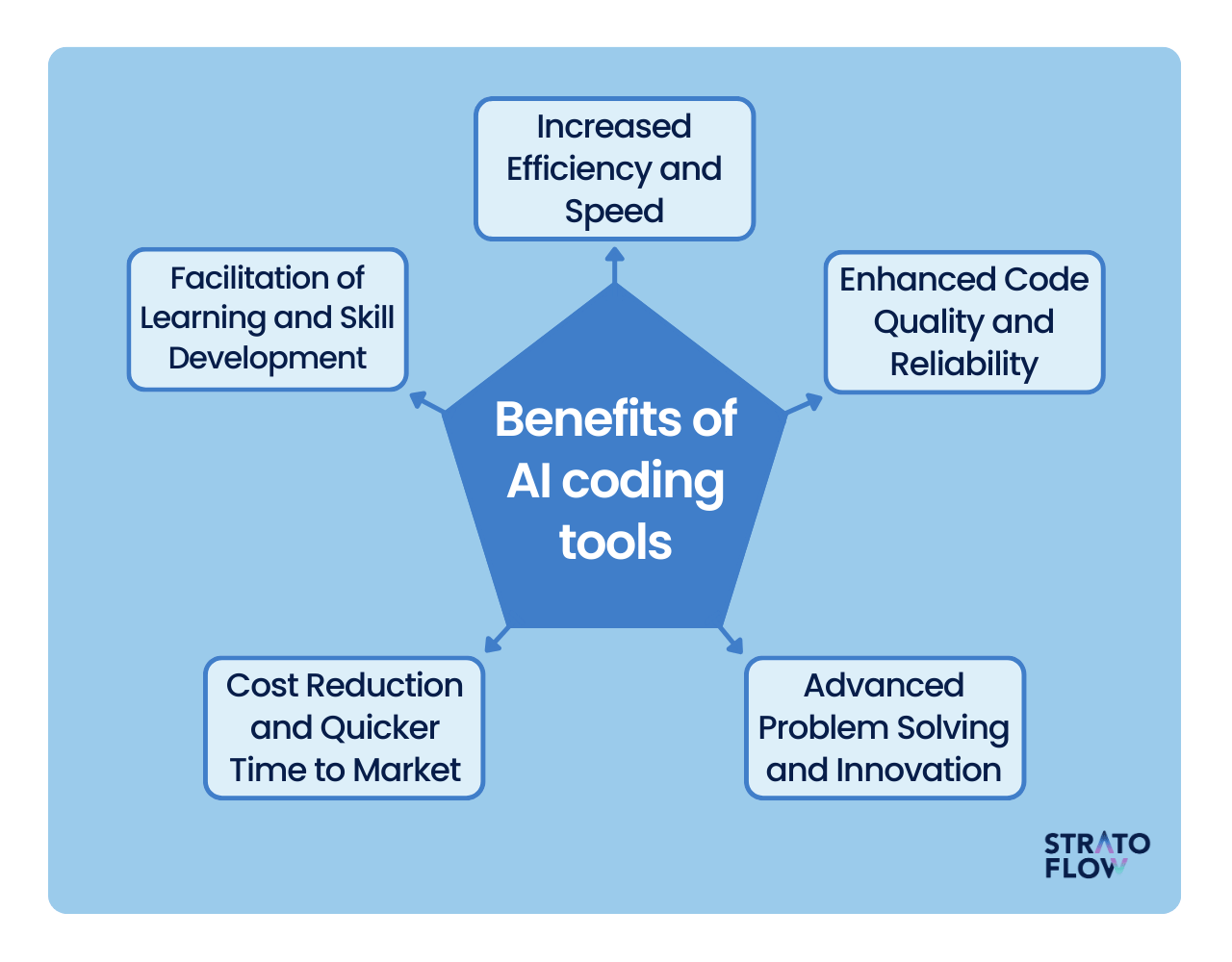
Increased Efficiency and Speed
Above all else AI tools can automate repetitive and routine programming tasks, such as boilerplate code generation, bug detection, and refactoring.
This automation can significantly speed up the development process, allowing programmers to focus on more complex and creative aspects of their projects.
Enhanced Code Quality and Reliability
That point sure sounds weird.
Didn’t we just mention that AI can produce results of questionable quality?
Yes, that’s true but, while staying careful, AI-driven tools can still analyze large codebases more efficiently than humans, identifying potential bugs, security vulnerabilities, and areas for optimization.
Advanced Problem Solving and Innovation
Some of the more advanced AI tools can even help you solve complex programming problems by suggesting innovative solutions and algorithms. This can be particularly useful in areas such as data analysis, machine learning, and algorithm optimization, where AI can process and analyze large data sets more efficiently than humans.
This aspect may be in its infancy, but remember that AI is evolving rapidly, so don’t be surprised if in a few months, AI tools are helping software architects with even more advanced tasks.
Cost Reduction and Quicker Time to Market
From the business perspective, AI tools can significantly reduce the costs associated with software development by streamlining various stages of the development process.
This advantage is key to big enterprises but also small startups as well.
By automating tasks and improving efficiency, these tools can help bring software applications to market more quickly, offering a competitive advantage in rapidly evolving industries.
Facilitation of Learning and Skill Development
AI tools are not only helpful for seasoned pros, but also for novice developers.
They can serve as learning aids for new programmers, providing real-time feedback and suggestions to improve their coding skills.
This is especially valuable in educational settings or for self-taught developers looking to expand their programming knowledge and expertise.
[Read also: Off the Shelf vs Custom Software: Pros & Cons + Examples]
Ten Best AI coding tools for software developers in 2025
AI code generators are incredibly powerful.
Let’s take a closer look at ten of the most interesting options on the market today.
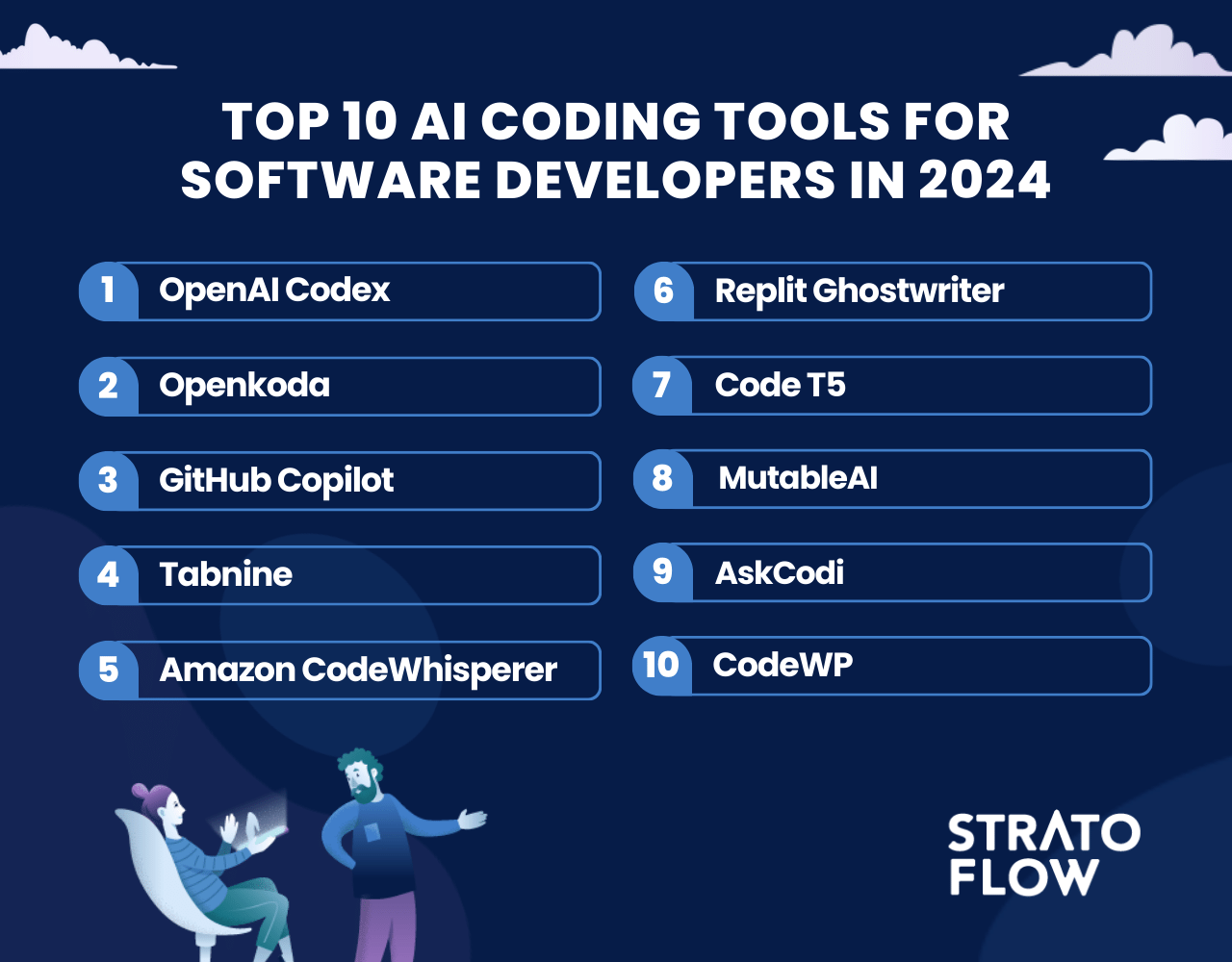
OpenAI Codex
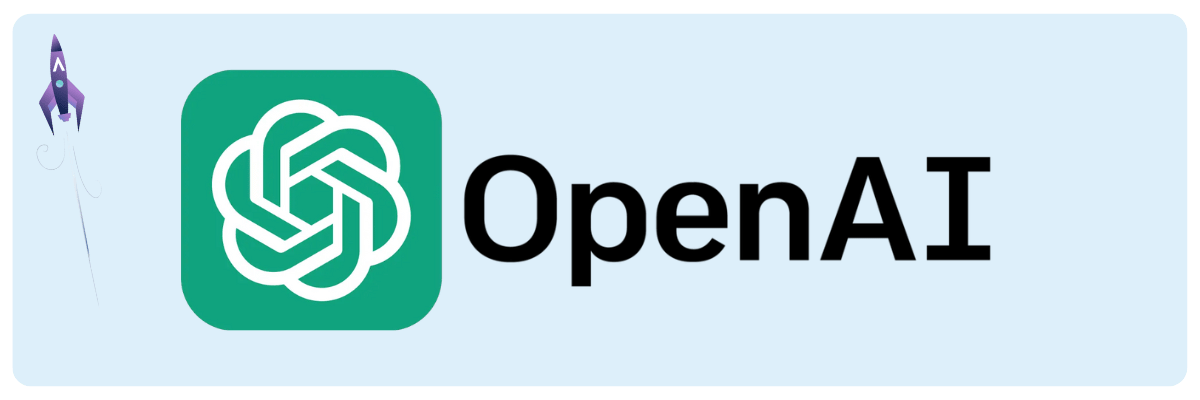
OpenAI Codex is a powerful AI model developed by OpenAI, designed to understand and write code.
It can be thought of as a variant of ChatGPT 4 designed solely for the use of software developers.
It’s proficient in writing code in over a dozen programming languages, including popular ones like Python, JavaScript, Java, C++, and Ruby. Codex is remarkably versatile in its applications: it can write code for various tasks, debug or explain existing code, translate code from one language to another, and even automate repetitive coding tasks.
Key features
- Multilingual Code Generation: OpenAI Codex can generate code in multiple programming languages such as Python, JavaScript, Java, C++, Ruby, and more. This versatility makes it a highly adaptable tool for various programming environments and tasks.
- Natural Language Understanding: Codex excels in understanding natural language queries, enabling users to describe the code they need in plain English.
- Wide Range of Applications: Codex is not just limited to writing new code. It can also assist in debugging, code translation between languages, code explanation, and automating repetitive coding tasks.
Key limitations
- Accuracy and Reliability Issues: While Codex is powerful, it’s not infallible. The code generated can sometimes be inefficient, contain bugs, or not perfectly align with the user’s intentions. Users need to review and potentially correct the output.
- Ethical and Security Concerns: The use of Codex raises concerns about ethical programming practices and security. It might inadvertently generate code that is vulnerable to security issues.
Pricing
OpenAI Codex has a subscription-based business strategy with various pricing categories.
Openkoda

Openkoda is an open-source, rapid custom software development platform designed to streamline enterprise and SaaS application development for Java developers.
It enables efficient, scalable, and secure application development.
Openkoda accelerates time to market by simplifying the development process and providing out-of-the-box functionality such as user management and payment integration.
A great example of AI functionality within Openkoda’s suite is Reporting AI.
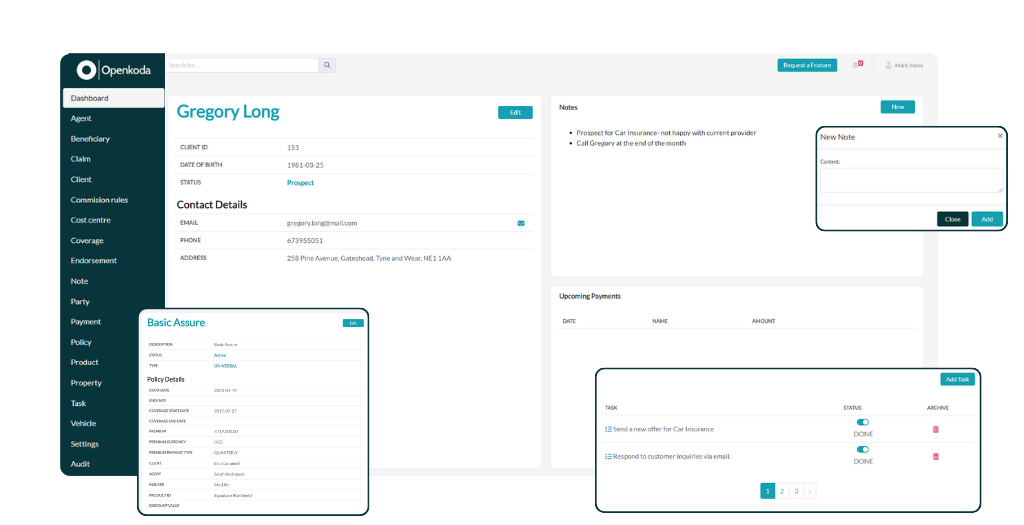
Reporting AI simplifies the reporting process by allowing users to input data queries using everyday language.
For instance, a user might type, “Show me the total sales for the last quarter.” The system’s AI component interprets the natural language input and converts it into a precise SQL query. This capability is powered by advanced language models designed to understand and accurately process user requests.
Once the query is generated, it is executed against the database to retrieve the requested information. The results are then presented in a user-friendly report format, which users can customize or save for periodic execution.
But that’s not all!
Thanks to the highly customizable core, developers can easily and quickly design, develop and deploy additional AI features into the system, creating an AI-powered claims management system or policy management system in no time!
Check out this quick demo to see how Reporting AI works in action:
Key features
- Rapid Software Development: Openkoda enables the swift development of applications by reducing the need for extensive hand-coding. Its intuitive interface and ready-made components allow software developers and to build applications quickly, significantly speeding up the development cycle.
- AI-Powered Development: With its AI companion integration, Openkoda can automate various aspects of the development process, such as code generation. This AI assistance not only improves efficiency but also helps in creating more sophisticated and reliable enterprise software solutions.
- Lower Costs of Development: By streamlining the development process, Openkoda lowers overall software development costs. It enables businesses to develop applications with fewer resources and in less time, making software development more accessible and cost-effective, especially for small to medium-sized enterprises.
Key limitations
- Ongoing Development: Openkoda, while offering innovative low-code and AI-powered development features, is still in the phase of ongoing development. Consequently, some of its advanced functionalities are in the process of being rolled out across subsequent updates.
Pricing
Openkoda is based on an open-source platform, meaning that its base functionalities are completely free of charge.
[Read also: AI Insurance: The Impact of AI on The Insurance Industry In 2024]
GitHub Copilot

GitHub Copilot is an AI-powered, intelligent code completion tool developed in collaboration between GitHub and OpenAI.
It’s built on the OpenAI Codex, a large language model (LLM) trained to understand and generate human-like code. Copilot integrates directly into a developer’s coding environment, making suggestions and completing lines of code in real-time.
It works by analyzing the context of the code being written and predicting the next lines or functions the programmer might need. This predictive capability is based on its training on a large corpus of publicly available code, allowing it to assist with a wide range of programming languages and tasks.
Key features
- Real-Time Intelligent Code Completion: GitHub Copilot excels in offering real-time code suggestions as developers type, effectively acting as an on-the-fly assistant. This feature significantly enhances coding efficiency, allowing for faster development of software projects.
- Context-Aware Suggestions: The tool is highly adept at understanding the context of the code being written. It analyzes the existing codebase and comments to provide relevant and situation-specific code snippets suggestions, ensuring that its contributions are meaningful and coherent with the ongoing project.
- Learning from Public Code: Copilot’s intelligence is derived from its training on a vast array of public code repositories.
Key limitations
- Quality and Reliability of Suggestions: Despite its advanced capabilities, GitHub Copilot’s suggestions aren’t always accurate or optimal. Users may find that some recommendations require modification or are not entirely suitable for their specific use case, necessitating a thorough review and understanding of the suggested code.
- Ethical and Licensing Concerns: The reliance on publicly available code to train Copilot raises questions about intellectual property and licensing.
Pricing
- Individual: $10 per month or $100 paid annually.
- Enterprise: $19 per user per month
Tabnine

Tabnine is an AI-powered code completion tool designed to improve the efficiency of software development.
Developed by Codota, Tabnine uses deep learning algorithms to provide intelligent code completions, predictions, and suggestions based on the context of the user’s current work.
Unlike some other tools that are trained on public code repositories, Tabnine’s model is trained on a mix of open-source code and proprietary code contributed by users to provide more diverse and accurate suggestions.
Effect?
Tabnine promises to provide you with more accurate and higher-quality code snippets. How true these promises are, we leave to you to find out.
A key feature of Tabnine is its ability to easily integrate with a wide range of Integrated Development Environments (IDEs), including popular ones like Visual Studio Code, IntelliJ IDEA, and PyCharm.
Key features
- IDE Integration: Tabnine is designed for seamless integration with a wide array of Integrated Development Environments (IDEs), such as Visual Studio Code, IntelliJ IDEA, PyCharm, and more. This integration enables developers to use Tabnine’s features directly within their preferred coding environments, enhancing workflow efficiency.
- Personalized Learning: Over time, Tabnine adapts to the individual coding style of the user, offering more personalized code suggestions. This learning capability ensures that the more a developer uses Tabnine, the more tailored and effective the suggestions become.
- Context-Aware Code Completion: Utilizing advanced deep learning algorithms, Tabnine offers intelligent, context-aware code completions.
Key limitations
- Limited Assistance in Complex Coding Tasks: While Tabnine is effective for standard code completions, it may have limitations in assisting with more complex, nuanced coding tasks or highly specialized areas of programming where context and subtlety play a significant role.
- Dependence on Quality of Training Data: The effectiveness of Tabnine’s suggestions heavily depends on the quality and diversity of the code it was trained on.
Pricing
- Starter: free version for 1 user
- Pro: $12 Month
- Enterprise: Available on contact
Amazon CodeWhisperer

Ever since ChatGPT gained traction a year ago, every other tech company has been scrambling to develop a big language model of their own. Amazon is no different with its CodeWhisperer.
Developed by Amazon Web Services (AWS), Amazon CodeWhisperer is an AI-powered code assistant designed to improve developer productivity.
Built using AWS’ extensive machine learning technology, CodeWhisperer provides real-time code recommendations and helps autocomplete lines of code with generated code snippets or even entire functions. CodeWhisperer is designed to support multiple popular programming languages and integrates with popular development environments.
What sets Amazon CodeWhisperer apart from other AI programming tools is its focus on security and best practices. It doesn’t just generate code; it also scans for security vulnerabilities and checks for biased code, ensuring higher quality and more secure code output.
Key features
- Security Recommendations: Amazon CodeWhisperer provides not just code completion but also security recommendations. It analyzes the code to identify potential security issues, helping developers write more secure code by adhering to best practices in cybersecurity.
- Code Refactoring Suggestions: Beyond basic code completion, CodeWhisperer offers suggestions for refactoring existing code. This feature can improve the readability, structure, and performance of the code, contributing to overall code quality and maintainability.
Key limitations
- Dependency on AWS Ecosystem: Being a product of Amazon Web Services, CodeWhisperer may be more seamlessly integrated and potentially more beneficial for projects that are already reliant on the AWS ecosystem. This could be a limitation for developers or organizations not using AWS services extensively.
- Limited Language and Framework Support: While CodeWhisperer supports several popular programming languages, its range of support may not cover all languages and frameworks, particularly newer or less common ones. This could limit its usefulness for developers working in those environments.
Pricing
Amazon CodeWhisperer is a tool for developers with a free Individual Tier and a Professional Tier costing $19 per user per month. The Professional Tier offers additional administrative and customization capabilities.
Replit Ghostwriter

Now for something different.
Replit is an online integrated development environment (IDE) based on cloud technology.
The interesting thing is that it is integrated with Replit Ghostwriter – a tool developed by the Replit team that uses artificial intelligence to provide real-time coding suggestions and completions.
This AI-driven tool is particularly effective in scenarios where rapid prototyping or learning programming is involved. Based on advanced machine learning models, Ghostwriter analyzes the user’s code in real-time and offers suggestions to complete or improve it, similar to predictive text in messaging.
It’s especially useful for beginners learning to code, as it can guide them through syntax and logic, and for experienced developers looking to speed up their workflow.
If you want to leverage AI capabilities in a web-based collaborative development environment, check it out!
Key features
- Interactive Learning Aid: Ghostwriter acts as an interactive learning tool, especially beneficial for beginners and students. By providing instant code suggestions and corrections, it helps users understand programming concepts and syntax more effectively, enhancing the learning experience.Efficiency in Coding: For more experienced developers, Ghostwriter offers a boost in coding efficiency. It quickly generates code snippets and solutions, reducing the time spent on routine coding tasks and allowing developers to focus on more complex aspects of their projects.
Key limitations
- Dependence on AI Accuracy: The effectiveness of Ghostwriter is contingent on the accuracy of its AI model. In some cases, the suggestions might not be entirely accurate or optimal, requiring users to have a good understanding of the code to identify and correct any inaccuracies.Potential to Hinder Deep Learning: While Ghostwriter is a valuable tool for beginners, there’s a risk that reliance on AI-driven code suggestions could hinder deeper learning and understanding of programming concepts.
Pricing
Replit Ghostwriter is an in-IDE AI chat tool that enhances coding productivity by offering features like auto-complete, debugging, and code explanations. It is available as an additional service to the development plans at a cost of $10 per month or 1,000 Cycles.
Code T5

Now for another AI tool developed by a Silicon Valley company – in this case, Salesforce.
Developed by Salesforce Research, CodeT5 is an advanced AI-based model designed specifically for understanding and generating code.
It is based on the Transformer architecture, similar to models like GPT-3, but fine-tuned for programming languages. The key is that it’s not just another add-on to a GPT architecture. Code T5 has been pre-trained on the CodeSearchNet dataset, which includes code in six programming languages: Ruby, JavaScript, Go, Python, Java, and PHP.
CodeT5 is capable of a number of tasks related to software development and coding, such as code summarization, where it generates concise descriptions of code snippets, and code generation, where it writes code based on natural language descriptions.
The technology behind CodeT5, as with any AI tool, involves training on a large dataset of code from various sources, enabling it to understand and generate code in multiple programming languages.
Key features
- Code Documentation Assistance: One of the notable features of CodeT5 is its ability to assist in code documentation. It can automatically generate comments and documentation for code, helping developers maintain well-documented and understandable codebases, which is crucial for long-term project maintenance.
- Enhanced Code Understanding: CodeT5’s advanced model allows it to not only generate but also interpret and understand code in a way that is more contextually aware. This makes it useful for tasks like code review and analysis, offering insights and suggestions that can improve code quality and efficiency.
Key limitations
- Training Data Limitations: The performance and reliability of CodeT5 are highly dependent on the quality and diversity of its training data. If the training data lacks representation in certain languages, paradigms, or styles, the model might underperform in those areas.
- Complexity in Integration and Usage: Integrating and effectively using CodeT5 in a development workflow might be more complex compared to simpler code assistants. Its advanced capabilities require a certain level of technical know-how, which could be a barrier for less experienced developers or those unfamiliar with AI-based tools.
Pricing
Code T5 AI coding assistant offers a range of pricing plans, starting with a free plan that includes basic features for individuals and organizations. For more advanced collaboration features, the Team plan is available at $48 per user per year for the first 12 months, which then reduces to $44 per user per year thereafter.
MutableAI
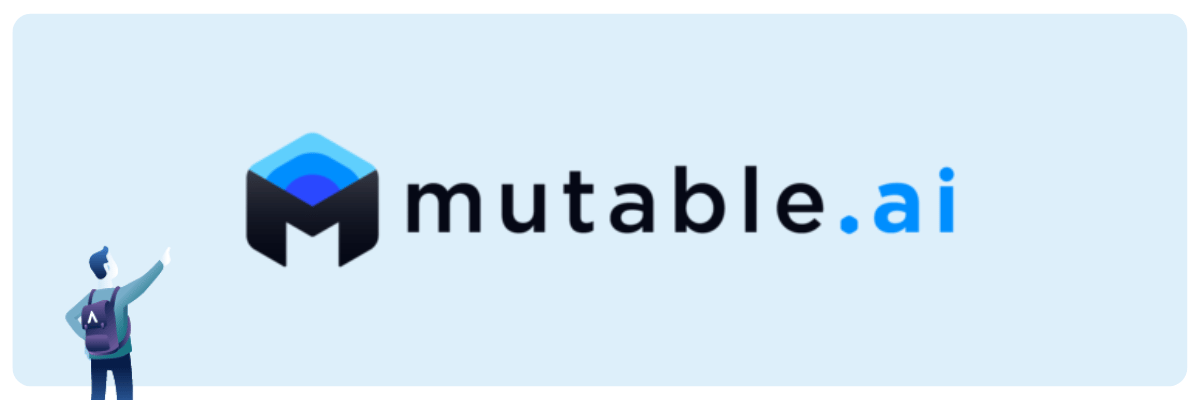
MutableAI is an AI-powered software development tool that integrates with platforms like VS Code and GitHub.
It features AI autocomplete for faster coding, and assists with documentation and code refactoring. In terms of its design orientation, MutableAI is primarily a back-end tool, as it focuses on improving coding efficiency, writing documentation, and refactoring code.
Key features of MutableAI include reducing the time spent on boilerplate coding and searching for solutions on platforms like Stack Overflow, thanks to its AI autocomplete feature. It also provides prompt-driven development, allowing users to modify code with AI-driven instructions. MutableAI is designed to improve the coding experience at multiple stages of the development process, making it a valuable asset for both back-end and front-end developers.
Key features
- AI Autocomplete: MutableAI’s AI autocomplete function suggests relevant code snippets based on the context and the developer’s intent, streamlining the coding process by reducing the time spent on boilerplate coding and manual searches for coding solutions.
- Code Refactoring and Documentation Writing: The tool assists in code refactoring and documentation writing, enhancing code quality and maintainability. It also allows users to give AI-driven instructions for direct code edits.
Key limitations
- Dependence on Integration Platforms: Being highly integrated with specific platforms like VS Code, Jupyter, and GitHub, its utility might be limited for developers who use different environments or require broader compatibility.
- Limited Independence in Complex Tasks: While AI autocomplete and prompt-driven development are helpful, they may not fully cater to complex coding challenges or highly customized coding requirements, potentially requiring manual intervention for advanced or unique coding scenarios.
Pricing
MutableAI provides a free plan with manual code suggestions and a Basic plan at $10 per seat per month for automatic suggestions. Higher-tier plans like the Auto Bug Codebase Pro and Elite are available at $25 and $50 per month, respectively, for more advanced features.
AskCodi
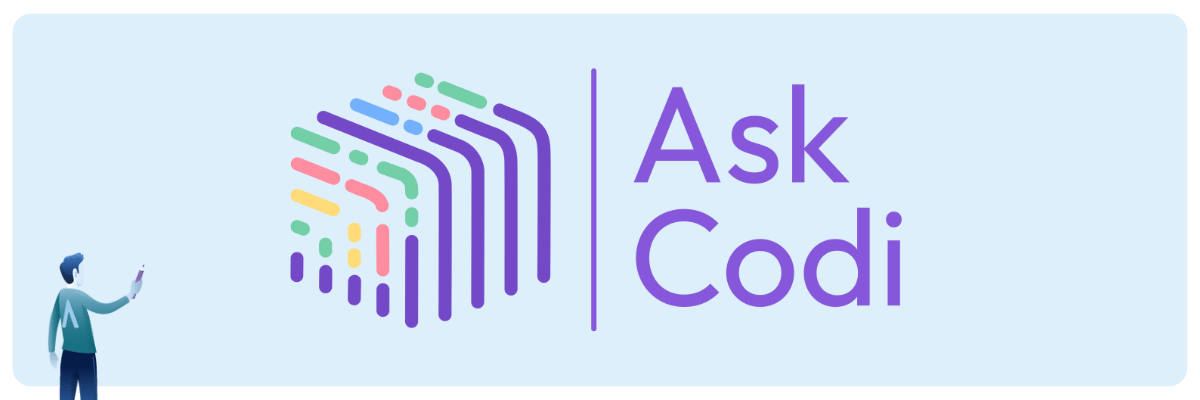
AskCodi is another AI-powered code generator designed to improve the software development process by making coding faster and more efficient with intelligent code suggestions.
It’s a relatively simple tool in concept, powered by OpenAI GPT, it offers a range of applications including code generation, unit test creation, documentation and code conversion.
A key strength of AskCodi is its support for over 50 languages and frameworks, with ongoing expansion to include more – classic ChatGPT often struggles with more obscure and less popular tech stacks. This wide range of language support, combined with features like streamlined syntax, automated comments, and integrated testing, allows developers to avoid repetitive tasks and focus more on execution.
Key features
- Codi Chat and Workbooks: AskCodi introduces unique features like Codi Chat and Workbooks, offering a more interactive and guided coding experience.
- Multi-Language Support: It supports over 50 programming languages and frameworks, showcasing its versatility in catering to a wide range of coding requirements and developer preferences.
Key limitations
- Limited Depth in Problem Solving: While AskCodi is adept at handling a range of coding tasks, it may not delve deeply into more complex or advanced programming challenges, potentially limiting its utility for high-level or specialized coding projects.
- Integration Challenges: Depending on its compatibility and integration with existing development environments and tools, developers might face challenges in seamlessly incorporating AskCodi into their established workflows, especially in more complex development setups.
Pricing
AskCodi offers a range of pricing plans, starting with a basic plan at $7.99 per month, which also includes a free version for those wanting to test the tool’s capabilities. There are various pricing tiers, with one of the higher-end options being the Ultimate Plan, priced at $29.99 per user per month (or $299.99 per user per year).
CodeWP

CodeWP is an AI WordPress code generator designed to improve WordPress development by generating code snippets and handling complex logic.
This tool greatly simplifies the process of building WordPress sites, allowing developers to generate code on-demand and reduce the reliance on manual searches.
Specifically, CodeWP can quickly and accurately generate code for WordPress plugins, custom post types, taxonomies, and Advanced Custom Fields (ACF), among other features. It stands out as a particularly powerful tool in the WordPress niche, being the first of its kind to offer such extensive capabilities for WordPress-specific development.
Key features
- Extensive Code Snippet Library: CodeWP offers a vast library of code snippets, enabling developers to easily find and implement the necessary code for various WordPress functionalities.
- Compatibility with WordPress Ecosystem: It is tailored for the WordPress ecosystem, supporting key aspects like custom post types, taxonomies, and Advanced Custom Fields (ACF), enhancing its utility in WordPress development.
- Streamlined Development Process: By allowing for the rapid generation of accurate code, CodeWP accelerates the development process, enabling faster website creation and iteration.
Key limitations
- Specificity to WordPress: CodeWP is highly specialized for WordPress, which may limit its utility for developers working on non-WordPress platforms or requiring a more generalized coding tool.
- AI-Dependent Accuracy: While it streamlines code generation, the accuracy of the generated code is dependent on the AI’s capabilities and may not always align with the specific requirements or complexities of certain WordPress projects.
Pricing
CodeWP offers a pricing plan starting at $18 per month, billed annually. This plan includes all free features, 10,000 actions per month, support for four projects, and over 28 plugin-specific AI modes for code and chat.
The future of AI coding: predictions for 2024
The exponential growth of AI is reshaping the landscape of many industries, including software engineering.
According to a GitHub survey 92% of U.S.-based developers already use AI-driven coding tools for personal and professional tasks. On top of that, 70% of the respondents believe AI coding tools give them an edge at work, offering better team collaboration while also preventing burnout. According to Forrester’s study, in 2023, AI-powered software will write 10% of the world’s code and tests.
If this data doesn’t scream AI revolution I don’t know what does.
But a burning question remains “Will AI replace programmers?”
Stroatoflow CTO, Arkadiusz Drysch, has put it this way:
Programmers who have a deep understanding of their craft and are familiar with various languages and programming paradigms don’t need not fear. Those who are code tappers, without any solid programming knowledge, and don’t do much beyond any current tasks – well, they’d better start learning.
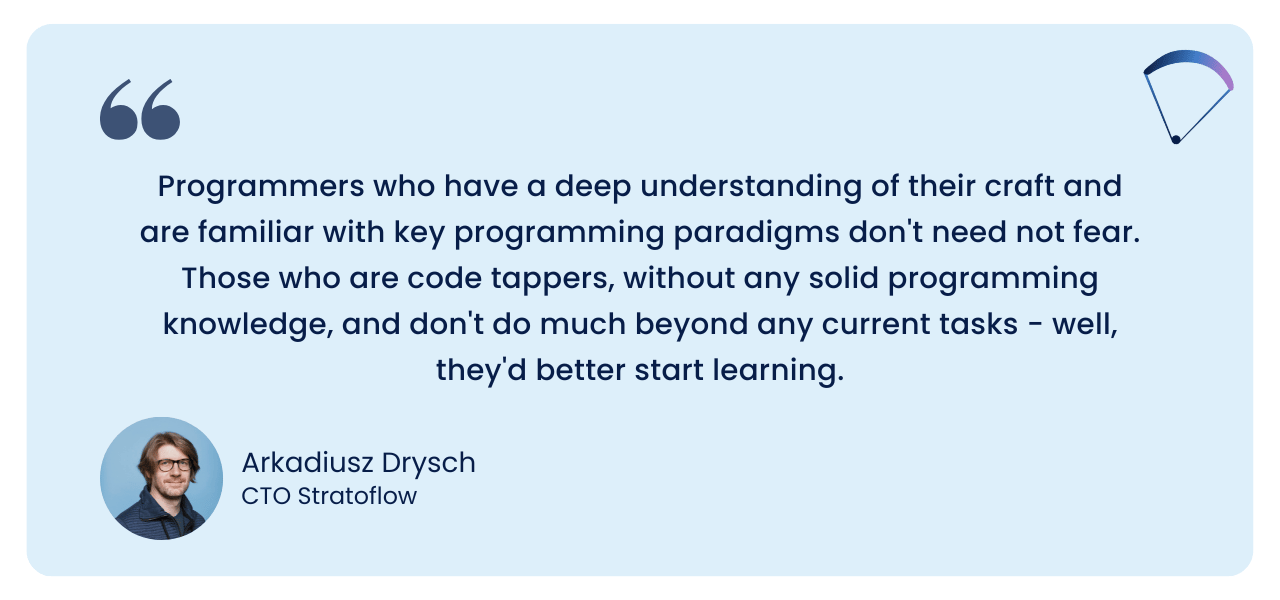
The future of AI-powered search engines, driven by Large Language Models (LLMs), promises a transformative era in information retrieval.
Some even say that we are only months away from AGI.
How much truth is that in this prediction?
Only time will tell.
One thing is for sure – the ear of artificial intelligence is here to stay and we have to do our best to stay ahead of the curve.
Related Posts
Thank you for taking the time to read our blog post!